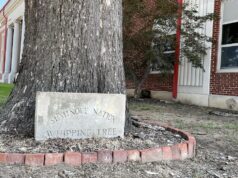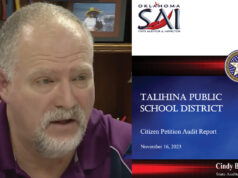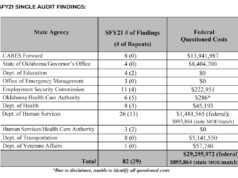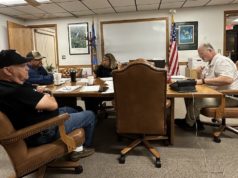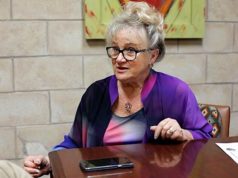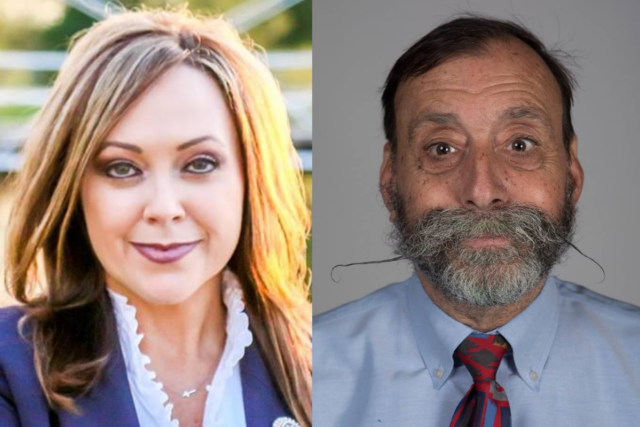

The auditor’s office is responsible for providing unbiased financial reports of Oklahoma institutions from state agencies to municipal governments. To run for state auditor and inspector, one must have at least three years’ experience in expert accounting.
Current State Auditor Gary Jones won the office in 2010 and was re-elected in 2014 without opposition. Term limits prevented him from running for state auditor this year, but he ran for governor and lost in the Republican primary.
The two candidates for state auditor and inspector spoke to NonDoc about their qualifications and reasons for running. No Democrat filed for the office.
Yeutter: ‘I am truly independent and objective’
A Libertarian, John Yeutter (rhymes with “lighter”) has been a certified public accountant for more than 20 years and holds a Ph.D. in accounting. He has taught auditing and government accounting at Northeastern State University for 23 years.
“I have a job that I love, and why would I want to leave the university campus and go to a place like the Capitol?” Yeutter said. “The answer I always give is: Somebody has to do it. And I would rather it be someone who is truly independent from the political process.”
Yeutter remarked on what he saw as the division between himself and Republican candidate Cindy Byrd yet declined to speak ill of his opponent.
“One of the key differences between [Byrd] and I is she has 20 years of experience working in the state auditor’s office,” he said. “I don’t like to criticize my opponent, but I do think that my independence is different from what her independence might be.”
Yeutter also spoke on why being a Libertarian separates him. He said some Libertarian ideals were what lead him to be an auditor in the first place.
“People need oversight over their government. Government should be transparent,” he said. “In a way, I agree with the Libertarian philosophy that government should be responsible to the citizens and not the citizens responsible to the government.”
In terms of policy, Yeutter talked about consistency across auditing.
“Our state finance is extremely complicated. It’s important to have the same kind of accountability at the state agency level and the statewide level,” Yeutter said.
Despite viewing his removal from politics as his biggest asset, Yeutter said he had no desire to drastically change the office.
“In a lot of ways, what an auditor does is a standard set of processes. And I don’t see anything I can point at what Gary Jones did and say, ‘Gary Jones did a bad job,'” he said. “I think the thing that might make me different is coming in with an independent look at what the agency is doing. But I’m not going to walk in day one and say, ‘Everything we’re doing is changed.'”
Yeutter told the story of the Oklahoma county commissioners scandal back in the early 1980s. More than half of Oklahoma county commissioners were indicted for federal corruption charges, and Yeutter said Oklahomans can learn from that scandal.
“It’s possible that the auditor could have caught that. It’s really hard to find fraud and corruption because it is hidden, and most often the way we find fraud and corruption is somebody who cares speaks up and points at something bad,” he said. “The auditor could surely approve of activities that counties or agencies have whereby whistleblowers can speak up.”
Yeutter again emphasized his objectivity.
“What voters can expect from me is an objective look at each agency,” he said. “There will be no ties from me to [the people I audit]. I am truly independent and objective. That’s the way I’ve always handled myself.”
Byrd: ‘I have the real, day-to-day experience’
Cindy Byrd, a Republican, got her education at East Central University, where she majored in accounting. In January, Byrd will have worked with the state auditor’s office for 22 years.
“I’ve spent my entire career auditing local government, special investigative audits,” Byrd said. “When Gary Jones came in seven and-a-half years ago, he appointed me to director over the county audit division. Those audits were five to six years behind (…) I got those audits caught up in about two years.”
Byrd said in order to deal with the backlog, she had to train both the state auditor staff and county officials better.
“Auditing is really my passion. It’s really something I love to do. It’s not just about playing gotcha. It’s about getting things right and getting people on track to be more accountable,” Byrd said. “Another reason I want to run is there’s a lot that needs to be done in this state.”
Specifically, Byrd identified a disconnect between what voters perceive the auditor’s office does and how it actually operates.
“There’s a big misunderstanding on what results an audit is going to accomplish. People tend to think if an entity is audited, everything is looked at,” Byrd said. “But there are different types of audits, and I think we need to get legislation changed to be able to do the right kind of audit to get taxpayers what they want.”
In the same vein, Byrd also advocated for making it easier for Oklahomans to learn the specifics of state agency finances.
“People don’t really understand which agency, what services they provide to the community,” she said. “And we need that information out where people can clearly see it and understand where the money is going. And we do need to educate people on how to get involved and know more about their government.”
Byrd did not wish to speak ill of her opponent, but she urged voters to consider her experience over Yeutter’s.
“I think Dr. Yeutter is a very nice man, and I’m sure he’s been a great professor,” she said. “But I have the real, day-to-day experience of auditing government agencies and finding fraud and waste. (…) In the last three years, I have exposed over $10 million in fraud and waste and six elected officials have been removed from office as a result of my audits.”
Despite that track record, Byrd said she did not want an adversarial relationship between the auditor’s office and elected officials.
“We will accomplish more by working together (…) I believe we should be a resource. We are the one office that you can trust the information that we compile and put out,” Byrd said. “And so as these people are making decisions, whether it be towards legislation or anything else, they should be able to come to us as a resource.”










